


In today's world, hernia has become quite a common occurrence. A hernia protrusion develops when tissue or organs push through a weakness or hole in the surrounding muscle walls. The groin or abdominal wall is where most hernias develop. Hernias have the potential to enlarge and become painful over time. When you cough, sneeze, get up, or engage in physical activity, you can experience discomfort or increased pain.
You need to get a hernia repair surgery to remove a hernia and reduce pain. According to NCBI, hernia surgery is common in the United States, and 800,000 surgeries are performed annually. In this blog, you will learn everything about hernia repair surgery.
Hernia repair surgery corrects a hernia, where organs protrude through a weakened body wall. In the procedure, a small incision is made near the hernia, and the displaced organ is repositioned. The weakened area is then fixed with stitches or mesh. This routine and safe surgery alleviates discomfort and aims to prevent recurrence, promoting a smoother recovery for individuals experiencing hernias.
Sometimes, you don't need an immediate hernia surgery as it takes time to develop fully. However, eventually, you will need to get the surgery as this condition will deteriorate in time and will cause you various problems.
Hernias can cause bulges when inner tissue forces outward via a rupture or breach in the muscle or tissue wall. They can cause unpleasant sensations such as pressure, discomfort, or pain. Depending on where your hernia is located, it may even affect your other organs and create issues.
Here are some reasons why you should get a hernia repair surgery:
Various surgical procedures are depending on the location and the type of hernia you have. The following are the primary hernia surgeries:
Your doctor will first diagnose you for the type of hernia. Once the diagnosis is complete, they will review and evaluate your medical history. Your doctor may prescribe some tests to ensure you can have surgery safely. These tests might include a blood test or an electrocardiogram (EKG). After checking the results, they will decide which surgery is suited for you.
Your doctor might ask you to stop taking aspirin and other drugs that raise the risk of bleeding about a week before your hernia surgery. Starting the night before surgery, you will be instructed not to eat or drink anything. This lowers the risk of vomiting during surgery.
See Also: Hiatal Hernia Revealed: Causes, Symptoms, Solutions
Your doctor will ask you not to eat anything the night before the surgery. You will have to wear loose clothes before the surgery. Next, your doctor will administer medications to prevent pain during the surgery. They will also put you to sleep with the help of anesthesia.
For open surgery, the surgeon will make a single larger incision or more minor cuts for laparoscopic or robotic surgery. Next, they will put the herniated tissue back in, strengthen weak tissue, and use surgical mesh for added support. Lastly, they will repair the incisions and treat your wounds.
Some hernia operations are outpatient procedures, allowing patients to return home the same day, while others may stay in the hospital, especially if there are complications. You might feel discomfort, and your doctor will suggest over-the-counter medications. Before leaving, you'll receive an aftercare plan to help you recover smoothly.
You will have pain and discomfort for the first 72 hours after the surgery. The time taken to recover completely from the hernia repair surgery will depend on various factors. These may include:
However, in most cases, you can resume your daily activities after one or two weeks, although you should avoid doing strenuous activities.
See Also: Understanding the Symptoms, Causes, and Treatment Options of Femoral Hernias
Hernia repair surgery is important as it not only relieves your symptoms but also decreases the complications that may arise if the condition is left untreated. With advancements in technology, the success rate and complete recovery of these surgeries have increased by a significant margin. So, getting a hernia repair surgery is only the right thing if you want to protect your health.
Dr. Madhu Prasad, our experienced surgeon, has been honored with the Best of Anchorage Awards, showcasing our dedication to excellence. If you are looking for the best hernia repair surgery or have any medical concerns, Far North Surgery is the right choice. Contact us today to learn more about our treatment plans and experience the highest level of care.